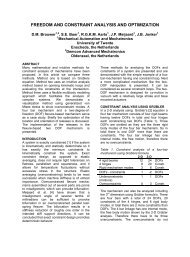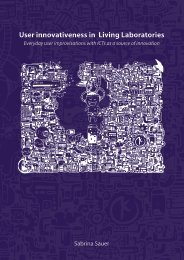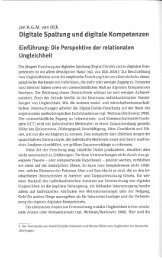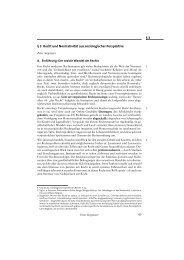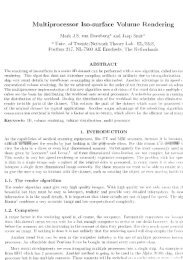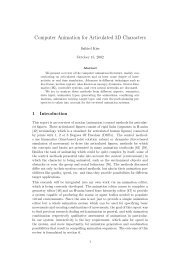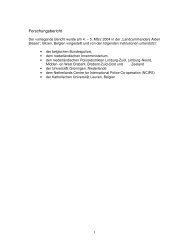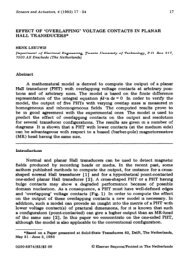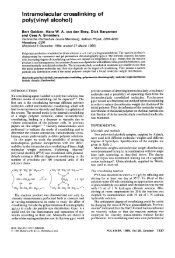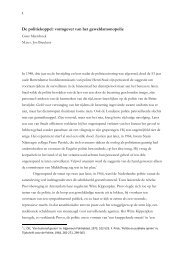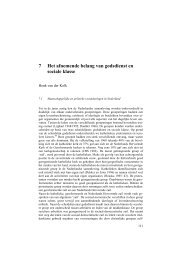Innovation and institutional change: the transition to a sustainable ...
Innovation and institutional change: the transition to a sustainable ...
Innovation and institutional change: the transition to a sustainable ...
Create successful ePaper yourself
Turn your PDF publications into a flip-book with our unique Google optimized e-Paper software.
Stability <strong>and</strong> transformation in <strong>the</strong> electricity system 91<br />
fur<strong>the</strong>r investments in nuclear power plants in <strong>the</strong> 1980s. Government <strong>and</strong><br />
<strong>the</strong> power generation industry considered nuclear as a necessary fuel source<br />
for future power generation. The Dutch government was at <strong>the</strong> point of<br />
authorisation of <strong>the</strong> building of two or three new nuclear plants, when <strong>the</strong><br />
Chernobyl accident occurred <strong>and</strong> this led <strong>to</strong> a decision <strong>to</strong> postpone <strong>the</strong><br />
authorisation, although it was suggested that <strong>the</strong>re was no connection with<br />
<strong>the</strong> accident. The general tide was also starting <strong>to</strong> turn against nuclear<br />
energy. The consumption of publicly generated electricity was not rising due<br />
<strong>to</strong> <strong>the</strong> oil crises <strong>and</strong> through energy saving measures. Moreover, due <strong>to</strong> lower<br />
oil prices <strong>the</strong> costs of nuclear power were no longer competitive with <strong>the</strong><br />
costs of fossil-based electricity. There was enough supply of natural gas <strong>and</strong><br />
it was possible <strong>to</strong> import electricity at lower prices. After 1987 nuclear<br />
power has no longer been a serious option for power generation, <strong>and</strong> Dutch<br />
parliament decided <strong>to</strong> phase out nuclear, by planning <strong>to</strong> close down <strong>the</strong> only<br />
Dutch nuclear plant still in operation. The knowledge infrastructure for<br />
nuclear energy did not disappear completely, initially domestic support was<br />
legitimised based upon maintaining up-<strong>to</strong>-date knowledge <strong>and</strong> expertise in<br />
<strong>the</strong> case major problems were solved (e.g. nuclear waste, <strong>and</strong> inherently safe<br />
reac<strong>to</strong>r designs), later new markets were developed in <strong>the</strong> nuclear activities<br />
of ECN.<br />
Literature on <strong>the</strong> development of nuclear energy in <strong>the</strong> Ne<strong>the</strong>rl<strong>and</strong>s is<br />
extensive <strong>and</strong> we summarise here some of <strong>the</strong> main conclusions 19 :<br />
– Dutch government implemented an active R&D strategy for nuclear<br />
energy, <strong>and</strong> pursued <strong>the</strong> development of a national industry;<br />
– The electricity sec<strong>to</strong>r was interested in <strong>the</strong> implementation of nuclear<br />
energy as a proven, mature technology, <strong>and</strong> was much less interested in<br />
<strong>the</strong> development of a national industry;<br />
– Nuclear energy fitted <strong>the</strong> know-how <strong>and</strong> routines of <strong>the</strong> electricity sec<strong>to</strong>r<br />
regarding large-scale, long-term investments, <strong>and</strong> <strong>the</strong> guiding principle of<br />
large central production units producing continuously for base-load<br />
electricity;<br />
– The decision making process regarding nuclear energy proceeded with<br />
very limited ac<strong>to</strong>rs involved (government <strong>and</strong> sec<strong>to</strong>r); was from <strong>the</strong> onset<br />
very technocratic, <strong>and</strong> did not involve societal groups;<br />
– The development <strong>and</strong> possible application of nuclear energy was<br />
something fundamentally new <strong>to</strong> both Dutch society <strong>and</strong> <strong>the</strong> knowledge<br />
infrastructure. Competencies regarding <strong>the</strong> technology had <strong>to</strong> be built up<br />
(<strong>and</strong> were built up both in terms of organisation, R&D <strong>and</strong> education);<br />
however competencies regarding <strong>the</strong> ‘sociotechnical’ issue of risk were<br />
absent;<br />
19 This is largely based on Hofman <strong>and</strong> Marquart (2001).



